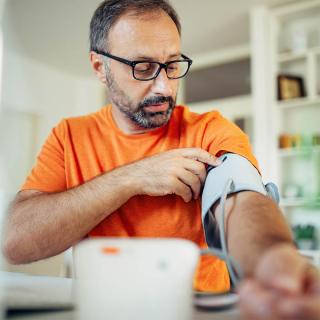What to expect when starting blood pressure medication for the first time

If you’ve recently been prescribed medication to treat high blood pressure (hypertension), you likely have a lot of questions. How does the medication work? Why do I need it? What are the side effects? How long will I need to take it?
Here is some helpful information about what you can expect when starting blood pressure medication for the first time.
What is high blood pressure and when is prescription medication needed to treat it?
If you’ve been diagnosed with hypertension, that means the force at which your blood pushes against the walls of your arteries is too high. This can scar, stiffen, or weaken your blood vessels, forcing your heart to work harder and making it weaker over time. If left untreated, high blood pressure increases your risk for stroke, heart attack, and heart disease.
A typically healthy blood pressure is below 120/80 mm HG. If your blood pressure is 120 to 129 over 80 or lower, you have elevated blood pressure. This can often be managed by lifestyle changes like eating healthier and exercising.
However, if your blood pressure is 130 or higher over 80 or higher, your doctor will likely prescribe you medication combined with lifestyle modifications.
How do blood pressure medications work?
There are several different classes of medications that work in slightly different ways:
- Diuretics help get rid of excess sodium and water through urine to lower your blood pressure.
- Angiotensin-converting enzyme (ACE) inhibitors or angiotensin receptor blockers (ARBs) help blood vessels to relax, widen, and improve blood flow to lower blood pressure.
- Calcium channel blockers help to relax and open up blood vessels to lower blood pressure.
- Beta-blockers help to lower heart rate and the heart’s workload, which, in turn, lowers blood pressure. They also help widen vessels to improve blood flow.
- Alpha blockers help to open and relax blood vessels to lower blood pressure.
- Blood vessel dilators (vasodilators) help to widen and relax vessels to lower blood pressure.
Not all medications are right for all people; some may be more effective than others depending on other health conditions and your personal situation. In some instances, your doctor may prescribe two or more blood pressure medications. There is evidence that two medications may be better at lowering blood pressure than the maximum dosage of one medication.
When should you take blood pressure medication
Generally your doctor or pharmacist will recommend taking your blood pressure medication in the morning, but a study published by the American Heart Association found that the time of day people take their medication doesn’t affect their 24-hour average blood pressure.1 Contact your doctor or pharmacist to talk about what’s right for your daily schedule.
Understanding the common side effects of blood pressure medication
Not everyone will experience side effects from their blood pressure medication. The most common side effects include:
- Tiredness
- Headache
- Dizziness
- Leg cramps
- Upset stomach
Usually these side effects go away within the first few weeks of taking your medication.
It’s always a good idea to talk to your doctor or pharmacist about the potential side effects of your blood pressure medication so that you know what you can expect. The side effects will also be listed on your medication label.
At-home blood pressure monitoring
When you start new blood pressure medication, your doctor will likely recommend that you monitor and keep a log of your blood pressure multiple times throughout the day or week. This can help your doctor figure out how well your medication is working and if you need a different medication dose.
You can do this using one of many traditional at-home blood pressure monitoring devices. New “wearable” blood pressure monitors are now available, but more studies are needed to assess their accuracy.
Blood pressure medications and medication interactions
Before starting blood pressure medication, talk to you doctor or pharmacist if you are pregnant or breastfeeding or have any other chronic health conditions like kidney or liver problems.
Also tell your doctor or pharmacist about any other medications you’re taking, both over-the-counter and prescription, to avoid potential harmful side effects or interactions. Some pain and anti-inflammatory medications, as well as stimulants, immunosuppressants, decongestants, hormonal birth control, and antidepressants, can raise or lower blood pressure.
Additionally, some foods can interact with blood pressure medications. For example, grapefruit increases blood levels of certain calcium channel blockers. Caffeine can cause a temporary spike in blood pressure.
Medication adherence is key
Once you’ve started taking blood pressure medication, it’s important that you continue taking it exactly as prescribed. Some patients stop taking their medication because they don’t feel sick. But high blood pressure is known as the “silent killer” for this very reason.
If you consistently skip doses of your medication or stop it abruptly, you can experience higher blood pressure, anxiety, chest pain, fast heartbeat, and swelling of your hands, legs, or feet. Most importantly, it could also raise your risk of heart attack and stroke.
If your doctor needs to change your medication or feels as though medication is no longer needed, they will come up with a strategy to slowly decrease your dosage over time to avoid potential side effects.
Helping you get your blood pressure in check
At Express Scripts® Pharmacy, we have pharmacists who focus on cardiovascular conditions, including treating and managing high blood pressure. Our pharmacists are available 24/7 to go over all the details of your new medication, as well as answer any of your questions and concerns.
Our pharmacists also know how important it is to stay on track with your maintenance medication. That’s why we notify you when you’re due for a refill or renewal. We can even reach out to your provider on your behalf.
1 Hypertension: Randomized Crossover Trial of the Impact of Morning or Evening Dosing of Antihypertensive Agents on 24-Hour Ambulatory Blood Pressure (August 27, 2018): ahajournals.org.
Original posted date: November 8, 2022
Posted date: June 27, 2024


